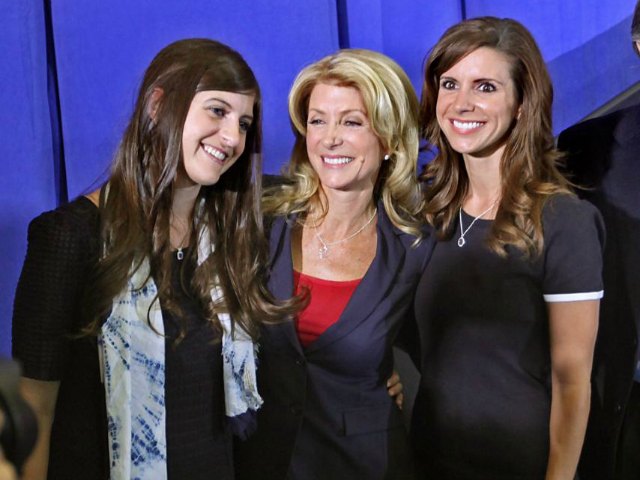Wendy Davis is going on the offensive, putting some distance between her biographical lies and her campaign by bringing out her family.
Daughters Dru and Amber published letters this week asserting that Davis did not abandon them, that she was a great mother, and other matters that were never in contention but make Davis sound good.
Dru and Amber Davis released letters individually Monday challenging the assertion that they had been “abandoned” by their mother after she divorced Dru’s father, attorney Jeffry Davis. The letters intend to tug at the heartstrings with the same story Davis asserted was true of her ascent to Harvard Law School. Dru Davis focuses almost exclusively on the idea that her mother was not there for her. “Sadly, I feel the need to be crystal clear on the malicious and false charge of abandonment as nothing could be further from the truth,” she writes, explaining that she could not live in Massachusetts with her mother during her term at Harvard because of her asthma, and her mother “miss[ed] so many classes so that she could be with us.”
Amber Davis’s letter gets closer to the heart of the lies surrounding her mother’s backstory. Condemning as “a shame that those who don’t know us feel the need to comment on the details of our lives as if they’ve lived them,” Davis’s oldest daughter argues that the specifics of the story are just not that important. “Yes, we lived in a trailer,” she confirms. “Does it matter how long? Not to me.” She also clarifies that she believes that the most important fact regarding who paid for her mother’s education is not that basic fact, but “the fact that she was accepted to Harvard Law School, a dream she believed was unachievable.” She adds without irony that she does not believe her mother “gives herself enough credit sometimes.”
The letters both aim to challenge the accusations that Davis was not a good mother or used her husband as a piggy bank to get through law school. It is true that, taken in isolation, these accusations have no place in a political campaign. But the media is only talking about the claims because Davis centered her entire campaign around them, on the plucky story of a poor girl who paid her way to the top through hard work and rigor. In reality, Davis’s marriage to her second husband catapulted her into Texas’ elite, and her experiences afterward seem to have little in common with the average single mother.
Yes, a minority of Davis’s opponents attacked her personal life directly and inexcusably, and both Abbott and Republicans generally should, as they have, distance themselves from that. The issues facing Davis’s integrity as a politician have nothing to do with her role as a mother and everything to do with how quick she was to lie about it. No one but Davis made her life story the driving force behind her campaign. To quote a brilliant editorial from the Waco Tribune, the press must take seriously a personal story “when the candidate herself begins touting dramatic personal narratives as a way to draw respect, admiration and votes. Then that narrative becomes fair game for unrelenting scrutiny by the press and the political opposition.”
And even taking into consideration that Davis’s daughters are willing to come forward to defend claims of “abandonment,” as they put it, this does little to answer questions about Davis’s political core. How serious is she about pro-choice Democratic values when she voted in multiple Republican primaries as early as 2006 and donated to the George W. Bush presidential campaign? How well does someone who roots for the football team her best friend’s family owns understand the plight of the poor and struggling in America?
Davis’s daughters never address those questions, because their experience with their mother has nothing to do with them. They still leave much doubt in the voter’s mind about the authenticity of a candidate like Davis–ostensibly the same issue her lies about her backstory make so prominent–and, if anything, create more questions.
It cannot be easy for Davis’s daughters to confront this past publicly, to be turned into human shields at the service of their mother’s ambitious quest for power. But Davis seems comfortable trotting them out, anyway, with no Democrat questioning whether the use of such “props” is appropriate like they did with Sarah Palin’s children. And they, now women, can choose the spotlight. But the criticism they claim is eating up at their mother’s campaign is nothing but a distraction–a trap orchestrated by the Davis campaign itself–to speak of nothing but sensitive personal issues while giving Davis a pass on her politics.

COMMENTS
Please let us know if you're having issues with commenting.